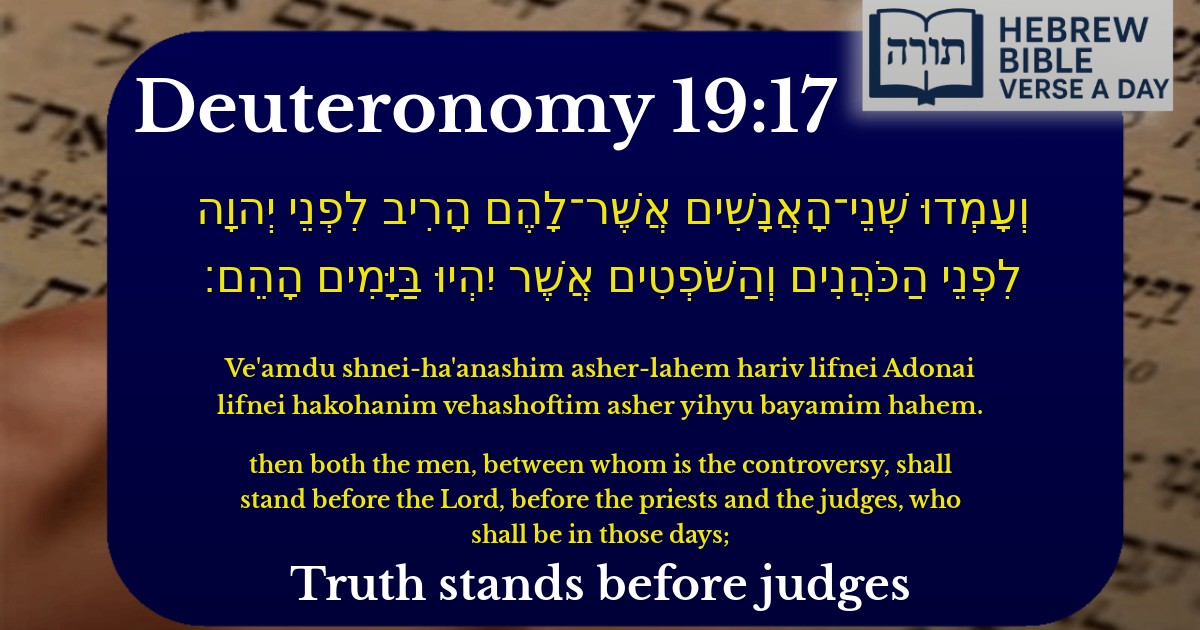Join Our Newsletter To Be Informed When New Videos Are Posted
Join the thousands of fellow Studends who rely on our videos to learn how to read the bible in Hebrew for free!
Hebrew Text
וְעָמְדוּ שְׁנֵי־הָאֲנָשִׁים אֲשֶׁר־לָהֶם הָרִיב לִפְנֵי יְהוָה לִפְנֵי הַכֹּהֲנִים וְהַשֹּׁפְטִים אֲשֶׁר יִהְיוּ בַּיָּמִים הָהֵם׃
English Translation
then both the men, between whom is the controversy, shall stand before the Lord, before the priests and the judges, who shall be in those days;
Transliteration
Ve'amdu shnei-ha'anashim asher-lahem hariv lifnei Adonai lifnei hakohanim vehashoftim asher yihyu bayamim hahem.
Hebrew Leining Text
וְעָמְד֧וּ שְׁנֵֽי־הָאֲנָשִׁ֛ים אֲשֶׁר־לָהֶ֥ם הָרִ֖יב לִפְנֵ֣י יְהֹוָ֑ה לִפְנֵ֤י הַכֹּֽהֲנִים֙ וְהַשֹּׁ֣פְטִ֔ים אֲשֶׁ֥ר יִהְי֖וּ בַּיָּמִ֥ים הָהֵֽם׃
Parasha Commentary
📚 Talmud Citations
This verse is quoted in the Talmud.
📖 Sanhedrin 2a
The verse is referenced in the discussion about the authority and jurisdiction of judges in different eras.
📖 Rosh Hashanah 25b
The verse is cited in the context of discussing the qualifications and roles of judges and priests in legal matters.


Context and Overview
The verse (Devarim 19:17) describes the procedure for resolving disputes between individuals in a Jewish court (Beit Din). The Torah mandates that both parties must present themselves before the kohanim (priests) and shoftim (judges) who serve in that generation. This emphasizes the importance of seeking justice through the proper halachic authorities.
Rashi's Explanation
Rashi (Devarim 19:17) clarifies that the phrase "before the Lord" refers to standing before the Sanhedrin, which convened in the Lishkat HaGazit (Chamber of Hewn Stone) in the Beit HaMikdash—a place of Divine presence. The judges must be those "who shall be in those days", meaning we are obligated to follow the rulings of the contemporary sages, even if they seem lesser in stature compared to earlier generations (see Rambam, Hilchot Mamrim 1:1-2).
Role of the Kohanim and Judges
Midrashic Insight
The Midrash (Sifrei Devarim 190) teaches that the phrase "who shall be in those days" implies that one must respect the authority of the judges of their time, rather than dismissing them by claiming, "If only we had judges like Moshe or Aharon!" This reinforces the principle of lo tasur (not deviating from the rulings of the sages, Devarim 17:11).
Halachic Implications
The Rambam (Hilchot Sanhedrin 1:1) derives from this verse that disputes must be brought before a proper Beit Din of qualified judges. Private settlements or secular courts are prohibited (chok l'Yisrael). The Shulchan Aruch (Choshen Mishpat 1:1) codifies this as binding halacha.